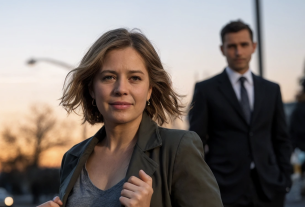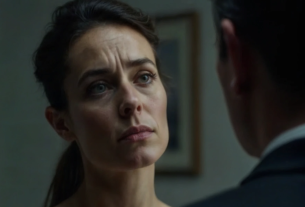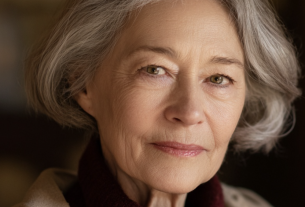In a prestigious, elite clinic, where patients arrived in expensive cars, and the lobby always smelled of freshly ground coffee served by experienced baristas, worked a young nurse named Alina. She was not just an employee—she was the living soul of the entire department. Kind, empathetic, and open-hearted, she always said, “Medicine is about helping everyone in need, regardless of how they are dressed or how much money they have.” For many, her words sounded like an ideal, but for Alina herself, it was a way of life.
One evening, during a quiet time, a man who seemed to have come straight off the street suddenly entered the emergency room. He was dirty, emaciated, his clothes torn to rags, his face covered with scrapes and bruises, and the smell emanating from him made those around instinctively step back. The security guards immediately moved to escort him out, but Alina stopped them without hesitation:
“This is a person. He’s in bad condition. I have to help him.”
Her voice was calm but firm. Against the wishes of the administrator and security, she took the man into a treatment room, carefully treated his wounds, gave him the necessary injections, and laid him down on a couch so he could at least rest a little. At that moment, the chief doctor and owner of the clinic, Artur Valeryevich, entered. Seeing the patient, he literally exploded with anger:
“Get this man out! Immediately! We are not a charity here! This is a private clinic! You’re fired!”
Alina said not a word. The next morning she packed her things and left without looking back. But her story—and even the fate of the clinic—did not end there…
A few days later, an elegant, well-groomed man of about sixty appeared at the clinic’s doorstep, carrying himself with dignity and confidence in every movement. He was accompanied by two bodyguards and carried a business briefcase. This was Nikolay Vasilyevich Drozdov—a famous billionaire, philanthropist, and founder of one of the country’s largest charitable organizations. He demanded a meeting with the management.
Entering Artur Valeryevich’s office, he placed a check on the table without a word.
“This is a donation—10 million rubles. But I have one condition.”
“What condition?” the doctor asked, surprised.
“Rehire that nurse. I am the very person who was thrown out. I wanted to see how your clinic treats those at rock bottom. And only one—your Alina—showed true humanity. Firing her for doing a good deed is not just a mistake. It’s a disgrace.”
These words hung in the air. The clinic froze. Rumors spread instantly among the staff. And the very next day, amid applause from colleagues, Alina put on her white coat again. But she did not just return to her previous position.
At the clinic’s entrance now hung a new sign:
“Help is not a luxury. It’s a duty. Doors open to everyone.”
Alina returned not as an ordinary nurse. Nikolay Vasilyevich insisted that she become the head nurse in the emergency department and also lead a new charitable project—providing free medical care to the homeless and needy.
At first, many employees were shocked. Some exchanged disapproving glances; others openly voiced their complaints:
“What now, treating everyone off the street? This is a private clinic!” the head nurse complained.
But time put everything in its place.
Every Friday, in a specially equipped wing of the clinic, a different life began. People from the streets came there—those with frostbite, purulent wounds, chronic illnesses that no one wanted to treat anymore. Alina received them as if they were important VIPs: with respect, attention, care, and warmth.
And then one Friday, a young unconscious man was brought to the clinic. Volunteers found him in an alley, in a state of extreme exhaustion. When Alina saw his face, a chill ran down her spine. Before her lay her own brother, with whom she had lost contact six years earlier after his sudden disappearance. He had been in an accident, suffered a head injury, lost his memory, and ended up on the streets. And only because Alina once opened the clinic’s door to a “homeless man” was she able to save the person closest to her today.
Later, at one meeting, she confessed:
“I didn’t save a stranger then. I saved my own. I just didn’t know it.”
These words stunned everyone. Even those who had doubted before began to understand: kindness has a way of returning, often in the most unexpected forms.
After the case with her brother, Alina felt her life fill with new meaning. She realized that nothing on her path had been accidental. What many considered naivety—her desire to help everyone without exception—became a bridge between despair and hope, between life and death.
Her brother gradually recovered. After treatment and rehabilitation, he began to remember his childhood, his sister’s face, the home. He was grateful to her not only for saving his life but for not turning away when he became nobody.
Meanwhile, the program to help those in need gained momentum. At first, it was one day a week. Then two. Volunteers, donors, and medical students came. Alina inspired people not with beautiful speeches but with her actions.
However, not everyone liked this.
Dr. Yudin, one of the clinic’s co-owners, began sabotaging the project. He demanded to close the “charity days,” cut funding, citing alleged damage to the clinic’s image:
“This is turning into a shelter! We’re losing premium clients!” he shouted at a meeting.
But that very day, a television crew arrived at the clinic preparing a report on socially significant medical initiatives. When Yudin began openly criticizing the program, the cameras recorded everything. The segment aired in prime time, and millions of viewers saw the true story: about kindness, dedication, and the greed of one man.
The public reaction was powerful. A week later, Yudin was removed from management. Nikolay Vasilyevich bought out his share and made Alina an offer she couldn’t refuse—to become the head of a new branch: the country’s first Center for Accessible Private Medicine.
And so, a year after all these events, a new clinic called “The Door” was ceremoniously opened, featuring a logo of an open palm—a symbol of acceptance and trust.
The first phrase written on the wall at the entrance read:
“Every person deserves help. The rest doesn’t matter.”
On Alina’s desk in her office stood a photo—her and her brother, both in white coats, smiling. Next to them was a handwritten inscription:
“We do not choose kindness. It chooses us.”



